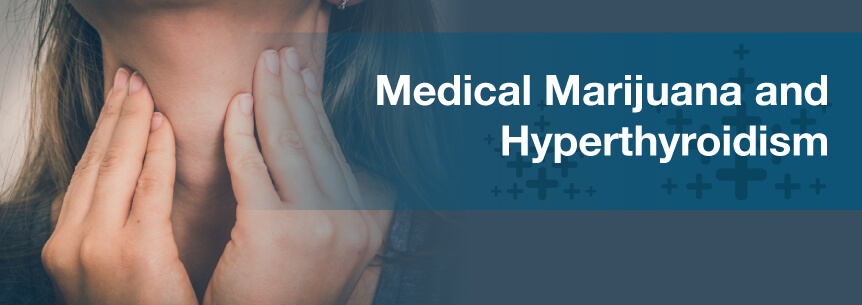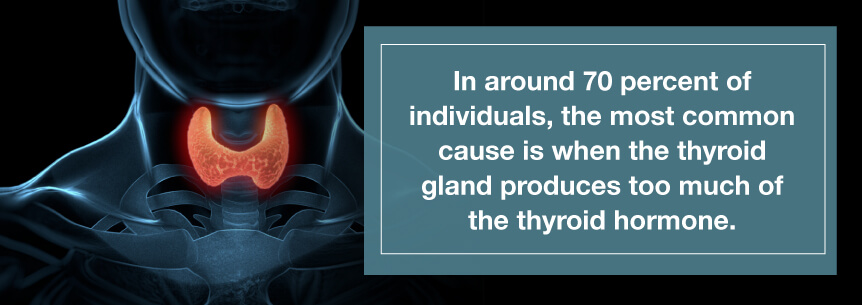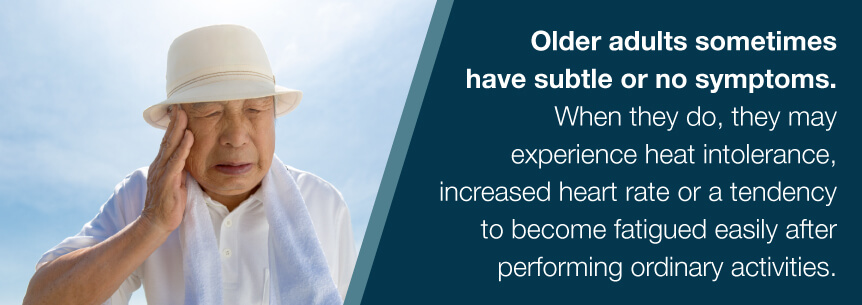
When you’re suffering from hyperthyroidism, you’ll be pleased to know cannabis oil may help ease many thyroid disorder symptoms, including problems with sleep, mood digestion, inflammation and more. Grave’s disease, which is a common cause of hyperthyroidism, results in marked inflammation throughout the body.
Current research reveals the significant role cannabinoids in medical marijuana and hyperthyroidism treatment play in maintaining balanced energies in your body, particularly your endocrine system. In fact, cannabis could be your answer for helping improve thyroid disorders like hyperthyroidism.
Recently, researchers have drawn a connection between the body’s endocannabinoid system (ECS) and the brain/thyroid communication network. Your ECS is greatly present in both your thyroid gland and central nervous system. It may play a significant role in assisting in proper communication between the thyroid and brain, implying your endocannabinoid system and its cannabinoid receptor network could directly promote efficient thyroid hormone release. This is important for overall homeostatic health and healthy organ functioning.
Cannabis CBD oil offers individuals some fantastic health benefits and doesn’t cause the “high” you get with THC. CBD has already been used successfully for treating inflammatory and autoimmune disorders — but what about hyperthyroidism?

Cannabinoids in medical marijuana for hyperthyroidism treatment respond well to your body’s natural innate cannabinoid substances. If anything, CBD maintains and balances your body’s homeostasis, and hyperthyroidism is an imbalance in the normal functioning of your body.
Individuals can use cannabis for hyperthyroidism only and treat almost all forms of thyroid malfunction like:
Anecdotal reports about successful and efficient CBD treatment confirm these claims. However, there are many scientific studies as well that showcase the therapeutic regulatory effects of cannabinoids on the hormone-secreting endocrine gland.
Find A Doctor Find A Dispensary
Not only does medical pot relieve some of the uncomfortable and painful symptoms of autoimmune diseases, but it also shows a lot of promise as a potent immunomodulator.
When you have a hyperactive immune system, chances are you have inflammation. Chronic inflammation keeps your body from normal functioning.
When you have inflammation in a part of your body like an organ, it can’t work properly. Over time, it can cause serious damage. When you lose functionality of any organ or another body part, it can result in serious problems to your long-term health, contributing to many symptoms.
During a study, researchers found using CBD decreased pro-inflammatory cytokines levels, while increasing anti-inflammatory proteins. CBD corrected the immune imbalance.
Symptoms cannabis and hyperthyroidism treatment helps with include:
Good medical cannabis for hyperthyroidism strains help relieve most, if not all, your symptoms. Some strains you can try include:
Strains for Eye Pressure
Strains for Fatigue
Strains for Anxiety and Depression
Strains for Weight Loss
Although you’ll find various methods of administering marijuana for hyperthyroidism, the most effective and potent method seems to be CBD oil due to its high quality. Oils, by nature, are molecular and therefore carry more CBD molecules “by volume” than other types of CBD products.
Additionally, CBD oil is easier to ingest and absorb successfully into your body when you place a few drops of it under your tongue, holding it there for around 90 seconds before you swallow it. But, you will find other methods as well, including:
If you’re interested in more information on marijuana and hyperthyroidism treatment or are looking for a cannabis doctor or dispensary, look no further than MarijuanaDoctors.com. We have tons of resources for you to educate you with more information on products, strains and medical marijuana-related news. After checking out our resources page, book a consultation with one of our qualified, friendly doctors to begin your journey into medical cannabis treatment.
Find A Doctor Find A Dispensary
Hyperthyroidism is a condition that causes people to have an overactive thyroid, which then produces excessive amounts of the thyroxine hormone. Hyperthyroidism significantly accelerates your metabolism, causing symptoms such as:
A few treatment options exist in helping with the condition. Doctors help slow thyroid hormone production by using radioactive iodine or prescribing antithyroid medications. Occasionally, patients require surgery to treat their hyperthyroidism, where the surgeon removes part or all of their thyroid gland. People respond well to treatment, but untreated hyperthyroidism can be serious.
Women, people over 60 years old and those with other thyroid issues have a higher risk for hyperthyroidism.
In around 70 percent of individuals, the most common cause is when the thyroid gland produces too much of the thyroid hormone. This condition is also called Graves’ disease, and is where the blood’s antibodies turn on the thyroid, causing it to grow and secrete more thyroid hormone than it’s supposed to. Graves’ disease often runs in families and frequently affects younger women.

There isn’t a lot of research as to why certain people get this condition. Some individuals might temporarily have hyperthyroidism symptoms when they have the thyroiditis condition. Thyroiditis is due to a viral infection that leads to a gland leaking thyroid hormone or an issue with their immune system. You may also experience these symptoms if you take too much of the tablet form of thyroid hormone. In both these cases, you have too much thyroid hormone, but your thyroid isn’t overactive.
Women are two to 10 times more likely to develop hyperthyroidism than men. You have a higher risk of the condition if you:
There are three common types of hyperthyroidism.
Though physicians have known about some of the symptoms of hyperthyroidism since prehistoric times, Armand Trousseau named the condition Graves’ disease, in honor of Irish physician Robert James Graves, in 1862.
Thyroidectomy was first used to treat Graves’ disease in 1884. Charles H. Mayo first introduced the term hyperthyroidism in 1910 to describe the conditions of toxic adenoma, primary exophthalmic goiter and adenomatous goiter with hyperthyroidism.
Hyperthyroidism may be challenging for your doctor to diagnose, since it can mimic other medical conditions. Hyperthyroidism symptoms may include:
Some individuals develop an enlarged thyroid gland, which is called a goiter.

Older adults sometimes have subtle or no symptoms. When they do, they may experience heat intolerance, increased heart rate or a tendency to become fatigued easily after performing ordinary activities.
In some cases, you may develop Graves’ ophthalmopathy, which is uncommon, but could affect your eyes, particularly if you smoke. Your eyeballs protrude past their regular protective orbits in this disorder when the muscles and tissues located behind your eyes swell.
When this occurs, it pushes your eyeballs forward to where they’re bulging out of their orbits, causing your front eyeball surfaces to become extremely dry. Problems with the eyes tend to improve even without treatment.
Graves’ ophthalmopathy symptoms and signs include:
When you leave hyperthyroidism untreated, it can cause serious complications, typically heart-related. Some potential heart-related effects of untreated hyperthyroidism include:
You also have a higher risk of developing osteoporosis if you leave your hyperthyroidism untreated.
In certain thyroid diseases, psychiatric symptoms occur. However, they happen more often in hypothyroidism and may include:
These can be episodic symptoms, or they could develop into depression, mania and delirium. Other symptoms that could occur in hyperthyroidism are apathy and motor inhibition.
Psychosis isn’t as common with hyperthyroidism, but has been reported in about 1 percent of cases. Most individuals who develop psychosis have already received a previous delirium or mania diagnosis.
Statistics associated with hyperthyroidism, according to the American Thyroid Association, include:

Your doctor will perform a physical exam and take down your medical history. However, to come up with an official diagnosis of hyperthyroidism, they’ll need to perform some other testing, since many hyperthyroidism symptoms are similar to those of other conditions.
Women who are having difficulty becoming pregnant will usually undergo testing for thyroid problems, since hyperthyroidism may cause problems with fertility.
To find the cause of your hyperthyroidism, doctors will evaluate various blood tests. They may also use imaging tests like a thyroid scan to help with diagnosing.
Treating your hyperthyroidism may involve medication, thyroid surgery or radioiodine therapy. The goal of treatment is to bring your levels of thyroid hormone back to normal, relieve uncomfortable symptoms and prevent long-term health complications. There isn’t one treatment that works for all people.
Your treatment will depend on what’s causing your hyperthyroidism and its severity. Your doctor will consider any potential allergies you have, your age, other conditions you have like heart disease or pregnancy, side effects of medications and other factors before recommending a treatment.
A couple of medications used to treat hyperthyroidism include:
While beta blockers don’t stop the production of thyroid hormone, they can help reduce your symptoms while you wait for other types of treatments to take effect. They act quickly in relieving certain hyperthyroidism symptoms like rapid heartbeat, tremors and nervousness. You may feel better in as little as a few hours after you take beta blockers.
Side effects of beta blockers include dizziness, headache, cold feet and hands, upset stomach, constipation or diarrhea. You may also experience dryness in your mouth, skin and eyes.
Antithyroid medications are the easiest way of treating hyperthyroidism. They cause your thyroid to produce less of the thyroid hormone. They don’t, however, provide you with a permanent cure. The most often used antithyroid medication is methimazole, but since this medication can harm a fetus, doctors often use propylthiouracil when treating pregnant women in their first trimester of pregnancy.
Once you begin your antithyroid medication treatment, it could take a few weeks or months for your thyroid hormone levels to get back into the normal range. One to two years is the average treatment time. However, it may continue for many years.
Some people may experience side effects in antithyroid medications such as:
Call your doctor immediately if you experience any of the following symptoms:
Doctors often treat women who are pregnant or breastfeeding with antithyroid medication because it’s a safer treatment for the baby.
Radioactive iodine (RAI) is an effective and common hyperthyroidism treatment. You take RAI-131 orally by liquid or capsule. It slowly destroys thyroid gland cells that are producing thyroid hormone, without affecting any of your other body tissues.
Side effects of RAI include neck swelling, neck tenderness, dry mouth, swelling or tenderness in the salivary glands, nausea and vomiting.
Surgery is the least-used type of treatment for hyperthyroidism. It’s where the surgeon removes part or most of your thyroid gland. Individuals with large goiters may require surgery. Any surgery, including that on the thyroid, poses the risk of infection.
After the 2003 hyperthyroidism seminar in the medical journal The Lancet, various reports helped enhance our knowledge of the end-organ manifestations of hyperthyroidism. They also helped with refining therapeutic decision making and recommend certain methods of treating Graves’ disease.
Antithyroid medications, surgery and radioiodine continue to be the three forms of treatments employed.
For more information about how cannabis can be used to treat Hyperthyroidism, check out our resources: